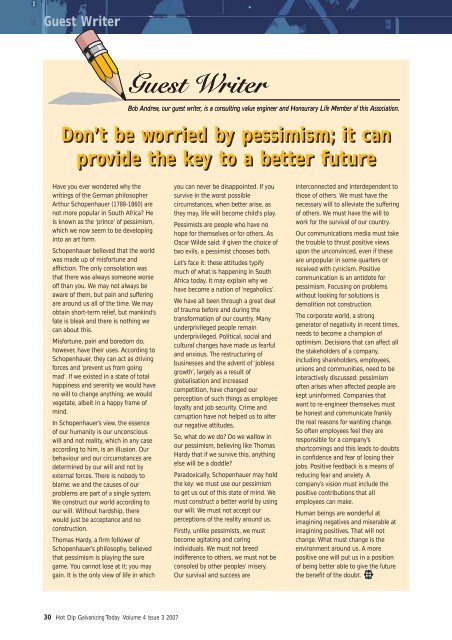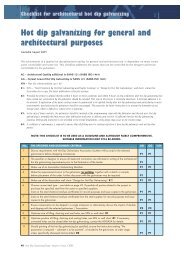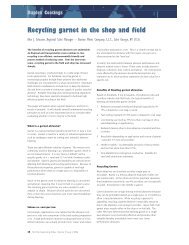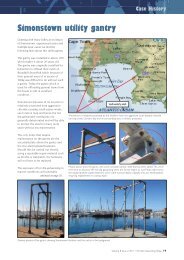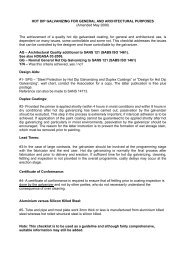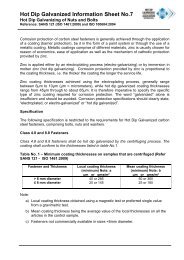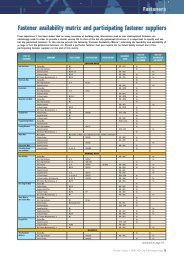Featuring: - hdgasa
Featuring: - hdgasa
Featuring: - hdgasa
You also want an ePaper? Increase the reach of your titles
YUMPU automatically turns print PDFs into web optimized ePapers that Google loves.
Guest Writer<br />
Bob Andrew, our guest writer, is a consulting value engineer and Honourary Life Member of this Association.<br />
Don’t be worried by pessimism; it can<br />
provide the key to a better future<br />
Have you ever wondered why the<br />
writings of the German philosopher<br />
Arthur Schopenhauer (1788-1860) are<br />
not more popular in South Africa? He<br />
is known as the ‘prince’ of pessimism,<br />
which we now seem to be developing<br />
into an art form.<br />
Schopenhauer believed that the world<br />
was made up of misfortune and<br />
affliction. The only consolation was<br />
that there was always someone worse<br />
off than you. We may not always be<br />
aware of them, but pain and suffering<br />
are around us all of the time. We may<br />
obtain short-term relief, but mankind’s<br />
fate is bleak and there is nothing we<br />
can about this.<br />
Misfortune, pain and boredom do,<br />
however, have their uses. According to<br />
Schopenhauer, they can act as driving<br />
forces and ‘prevent us from going<br />
mad’. If we existed in a state of total<br />
happiness and serenity we would have<br />
no will to change anything; we would<br />
vegetate, albeit in a happy frame of<br />
mind.<br />
In Schopenhauer’s view, the essence<br />
of our humanity is our unconscious<br />
will and not reality, which in any case<br />
according to him, is an illusion. Our<br />
behaviour and our circumstances are<br />
determined by our will and not by<br />
external forces. There is nobody to<br />
blame: we and the causes of our<br />
problems are part of a single system.<br />
We construct our world according to<br />
our will. Without hardship, there<br />
would just be acceptance and no<br />
construction.<br />
Thomas Hardy, a firm follower of<br />
Schopenhauer’s philosophy, believed<br />
that pessimism is playing the sure<br />
game. You cannot lose at it; you may<br />
gain. It is the only view of life in which<br />
you can never be disappointed. If you<br />
survive in the worst possible<br />
circumstances, when better arise, as<br />
they may, life will become child's play.<br />
Pessimists are people who have no<br />
hope for themselves or for others. As<br />
Oscar Wilde said: if given the choice of<br />
two evils, a pessimist chooses both.<br />
Let’s face it: these attitudes typify<br />
much of what is happening in South<br />
Africa today. It may explain why we<br />
have become a nation of ‘negaholics’.<br />
We have all been through a great deal<br />
of trauma before and during the<br />
transformation of our country. Many<br />
underprivileged people remain<br />
underprivileged. Political, social and<br />
cultural changes have made us fearful<br />
and anxious. The restructuring of<br />
businesses and the advent of ‘jobless<br />
growth’, largely as a result of<br />
globalisation and increased<br />
competition, have changed our<br />
perception of such things as employee<br />
loyalty and job security. Crime and<br />
corruption have not helped us to alter<br />
our negative attitudes.<br />
So, what do we do? Do we wallow in<br />
our pessimism, believing like Thomas<br />
Hardy that if we survive this, anything<br />
else will be a doddle?<br />
Paradoxically, Schopenhauer may hold<br />
the key: we must use our pessimism<br />
to get us out of this state of mind. We<br />
must construct a better world by using<br />
our will. We must not accept our<br />
perceptions of the reality around us.<br />
Firstly, unlike pessimists, we must<br />
become agitating and caring<br />
individuals. We must not breed<br />
indifference to others, we must not be<br />
consoled by other peoples’ misery.<br />
Our survival and success are<br />
interconnected and interdependent to<br />
those of others. We must have the<br />
necessary will to alleviate the suffering<br />
of others. We must have the will to<br />
work for the survival of our country.<br />
Our communications media must take<br />
the trouble to thrust positive views<br />
upon the unconvinced, even if these<br />
are unpopular in some quarters or<br />
received with cynicism. Positive<br />
communication is an antidote for<br />
pessimism. Focusing on problems<br />
without looking for solutions is<br />
demolition not construction.<br />
The corporate world, a strong<br />
generator of negativity in recent times,<br />
needs to become a champion of<br />
optimism. Decisions that can affect all<br />
the stakeholders of a company,<br />
including shareholders, employees,<br />
unions and communities, need to be<br />
interactively discussed: pessimism<br />
often arises when affected people are<br />
kept uninformed. Companies that<br />
want to re-engineer themselves must<br />
be honest and communicate frankly<br />
the real reasons for wanting change.<br />
So often employees feel they are<br />
responsible for a company’s<br />
shortcomings and this leads to doubts<br />
in confidence and fear of losing their<br />
jobs. Positive feedback is a means of<br />
reducing fear and anxiety. A<br />
company’s vision must include the<br />
positive contributions that all<br />
employees can make.<br />
Human beings are wonderful at<br />
imagining negatives and miserable at<br />
imagining positives. That will not<br />
change. What must change is the<br />
environment around us. A more<br />
positive one will put us in a position<br />
of being better able to give the future<br />
the benefit of the doubt.<br />
30 Hot Dip Galvanizing Today Volume 4 Issue 3 2007


